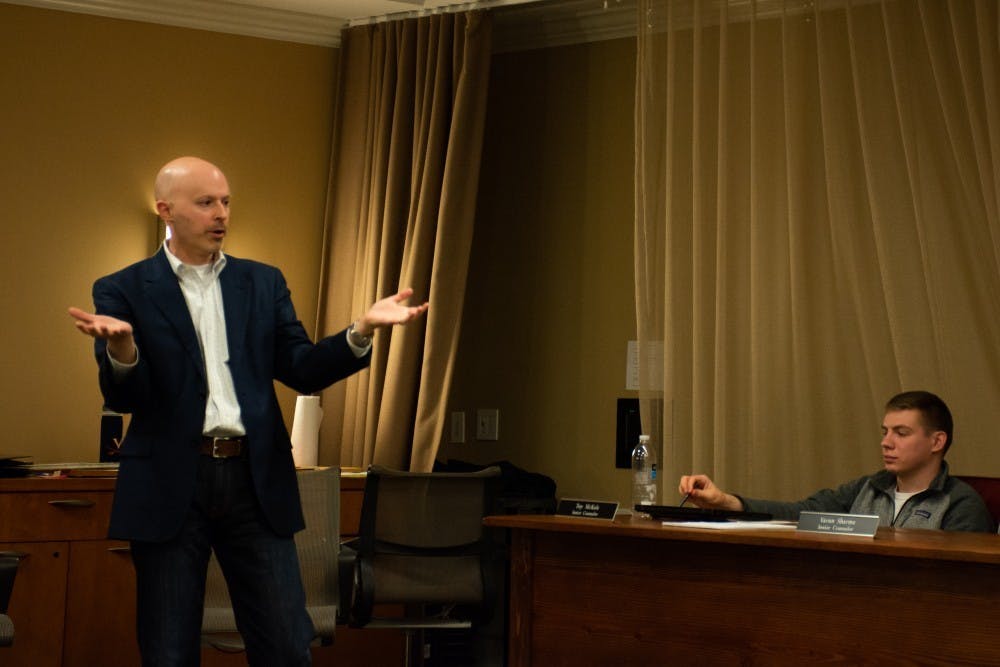The University Judiciary Committee summarized the University Board of Elections results and heard from Assistant Vice President for Student Affairs Marsh Pattie at its general body meeting Sunday. Pattie, who served as a UJC representative during his time in the Curry Graduate School of Education from 2002 to 2003, discussed how UJC has changed in the last 20 years.
Despite efforts to increase voter turnout, the constitutional amendments UJC hoped to pass in the recent elections failed due to a nine percent voter turnout. UJC proposed four constitutional amendments including a change to expand representative eligibility to second-year students, adding gender expression to the protected classes under the sanction enhancement clause, establishing a quorum for Representatives to vote on Constitutional changes and establishing a method for the committee to internally pass trivial amendments to the Constitution. To pass, constitutional amendments require 10 percent of the student body to vote as well as a two-thirds threshold in favor of the amendment.
“We hypothesized that one of the reasons [for low voter turnout] was just because there were so many uncontested elections,” Shannon Cason, fourth-year College student and UJC chair, said. “It's disappointing to hear, but if the 10 percent had been met it is likely that they would have been passed.”
While several new representatives were elected to the UJC Executive Committee, there are still vacant positions. Currently, both the Undergraduate and Graduate Curry School of Education, the Graduate School of Arts and Sciences and the School of Continuing and Professional Studies are missing representatives.
According to Cason, this is not unusual. UJC will reach out to each school’s leadership to make them aware of the vacancy and work to establish a process for filling the role.
“It's more of an individualized process,” Cason said. “Some schools might search for candidates and pick them out … some schools might have their own internal elections that they just do later.”
UJC has also started the process for filling the roles of Senior Educator, Senior Investigator and Senior Counselor, who are members of the Executive Committee that oversee the selection of new support officers. This is an internal UJC process that takes place after UBE elections. Potential candidates can express interest now, but selections won’t happen until after all of the voting positions are filled, according to Cason.
UJC then heard from Pattie, who discussed his experience with UJC and how its role has changed in the past 20 years. As a former representative, Pattie advises UJC and handles state government relations as Assistant Vice President.
Pattie began the discussion by detailing what has changed since his time on UJC. Sexual assault and misconduct cases were previously adjudicated by a Sexual Assault Board — a group of faculty, staff and students which UJC did not have representation on.
The Sexual Assault Board was eventually disbanded due to regulation under the Obama administration — now, sexual assault cases are adjudicated through the Title IX office.
Pattie went on to stress the fear he’s seen develop because of the increased potential for lawsuits that could arise out of UJC’s decisions. Pattie expressed how UJC didn’t have to deal with that years ago and noted that it is something that worries him today. In response, he emphasized the “tried-and-true” training of UJC support staff — including a written examination and occasional performance reviews — and encouraged members to trust their process, noting that if legal issues come up, the University’s administration would handle them.
“We should continue to be careful not to let that guide our philosophy and not let that influence our decision-making process in cases,” Pattie said. “As your successors come into play, don’t shy away from doing the role that your peers across this University have charged you to do.”
Pattie also pointed out that the Virginia General Assembly considered a bill this year that would allow lawyers to participate in UJC trials. The patron of the bill, Delegate Joseph Lindsey, D-Norfolk, ultimately ended up removing this component from the legislation. Pattie warned members that legislation like this would not be beneficial for UJC.
“That would fundamentally change how this process works,” Pattie said. “If a lawyer is allowed to be in the room and actively and verbally engage in discourse, that changes the dynamics. Essentially, it could deal a damaging blow — potentially a fatal blow — to student self governance.”
Pattie also highlighted what has not changed about UJC since its inception, discussing the commitment to student self-governance and the ability of its members to touch on difficult, sometimes controversial topics. He noted that back in 2002, the student body was still dealing with the aftermath of the 9/11 terrorist attacks — an experience that taught him how important it was that UJC was able to confront difficult issues.
“In some respects, a lot of those issues that we dealt with, we’re still regrettably, unfortunately dealing with them today,” Pattie said. “This body was not afraid to think about those things and deal with those things.”
To close out his discussion, Pattie emphasized the importance of UJC to the University.
“The work that you do every day is important,” Pattie said. “It’s hard, it can be challenging, but you’re part of a long legacy of people who have come before you … you are the caretakers and stewards for those who are going to come after you.”
UJC meetings take place every other Sunday at 6 p.m. on the fourth floor of Newcomb Hall.







